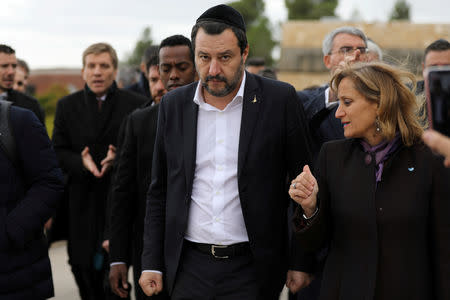Italy's Salvini criticised by allies for calling Hezbollah "terrorists"
JERUSALEM (Reuters) - Italian Deputy Prime Minister Matteo Salvini defended himself against attacks from his own government on Wednesday, after he was criticised for calling the militant group Hezbollah "Islamist terrorists".
Salvini, who is head of the rightist League party, began a two-day visit to Israel on Tuesday with a tour of the country's northern border, where the Israeli army says it has uncovered attack tunnels built by Hezbollah from Lebanon.
He later denounced the Shi'ite group as "terrorists" and doubled down on his comments on Wednesday following criticism from the 5-Star Movement, his coalition allies.
"It is strange to read in the Italian newspapers that some people are amazed that I call Islamist terrorists what they are, Islamist terrorists," he said in a video on his Facebook page.
"Let us give the right weight to words. If we do not identify the adversary, I am not saying enemy but adversary, then the game will never be won," he said.
The row comes as the balance of power between the League and 5-Star in the government appears to be shifting, with Salvini's party surging past its allies in the polls. Newspapers have speculated Salvini might look to trigger early elections next year, although he has repeatedly denied this.
Italy is usually highly cautious over Hezbollah, not wanting to create problems for Italian forces operating in Lebanon as part of the U.N. peacekeeping force, UNIFIL. It is a major contributor to UNIFIL, which is currently headed by an Italian, Major General Stefano Del Col.
Defence Minister Elisabetta Trenta, who is a member of 5-Star, urged Salvini to think carefully about what he says. "We always have to have in mind that our soldiers every day risk their lives for our stability," she said in a statement.
Another 5-Star politician, foreign ministry undersecretary Manilo Di Stefano, went further: "To speak about geopolitics without understanding the causes and only to support the strongest party, damages (the region's) people and peace."
Salvini met Israeli politicians during his flying visit and did not travel to the occupied West Bank or see Palestinian leaders.
The European Union decided in 2013 to put the armed wing of Hezbollah on its terrorism blacklist, a move driven by concern over the Lebanese militant group's involvement in a deadly bus bombing in Bulgaria in 2012 and the Syrian civil war.
The movement is an ally of Iran and has sent thousands of fighters into Syria, helping to turn the tide of that country's war in favour of Syrian President Bashar al-Assad.
(Reporting by Crispian Balmer, editing by Larry King)

 Yahoo News
Yahoo News 

